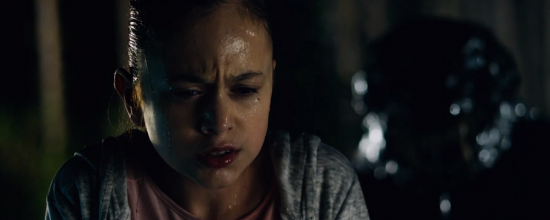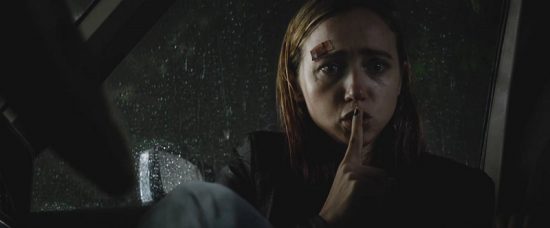Review: The Monster – “The latest in the new generation of horror films”
Fans of the ‘horror’ genre have been treated to a very low standard of movies as of late. It seems now that every week we see a new trailer unveiled, of a horror film based on the “true story” of a possession in some town, the exorcism of a little girl, or any other severely overused, formulaic narrative that, honestly, stopped being scary quite a few years ago. So whilst mega-budget, big-studio produced horror films such as The Conjuring 2 (2016), Insidious (2010) or Annabelle (2014), get all the attention from the media, critics and audiences, a new wave of horror films is slowly building momentum, and they’re here to show us what a horror film should really be about.
In recent years, with the releases of the films The Babadook (2014), It Follows (2014), Goodnight Mommy (2014), The Witch (2015), among others, this new generation of horror films has got stronger and stronger; a genre that bases itself on analogies about themes such as mental disorders, grief or depression, serious topics that are symbolically represented on screen in the form of the darkest figments of our imagination. It works as a creation of the kind of fear that you experience in a nightmare, as opposed to that of being in a haunted house.
The Monster (2016) is the latest film of this wave, directed and written by Bryan Bertino, it tells the story of an alcoholic, irresponsible mother Kathy (Zoe Kazan) and her daughter Lizzy (Ella Ballentine), who, after being in a mild car accident in the middle of the night, are left stranded on an isolated road. Stalked by a mysterious man-eating creature of the dark, mother and daughter must work together to survive, despite their messy, sad, and semi-abusive relationship.
There’s a lot to praise about the film’s on-screen execution. From the opening scene, where Lizzy has to clean up empty bottles of alcohol and cigarettes from her mother’s night of drinking, and then consequently wake her mother up because she slept in- the director makes great work of setting the film’s tone, the relationship between Lizzy and her mother is quite hostile, disturbing, and at times awkward. It seems that in this household, the roles have been inversed and Lizzy is the “mature adult” (she’s even asked by her mum if she has permission to smoke in the car). It’s worth noting that both Zoe Kazan and Ella Ballentine are on-screen almost all throughout the film, and although there’s two or three other characters, they’re irrelevant in the face of a narrative that revolves around the tension between Lizzy and Kathy. The chemistry between Kazan and Ballentine is fantastic; Kazan shows her versatility in a role that demands a lot from her as an actress, whilst 14 year-old Ballentine puts out a star-making performance, captivating and taking centre stage in a film that’s all about making the audience feel what the characters are feeling.
The first half of the film is tense, smart, and very engaging. Its empathetic, believable characters successfully engage us in the drama and make us feel Lizzy’s traumatized mind from having two irresponsible, alcoholic parents raise her. How scary it must have been for her to see her mother’s deteriorating lifestyle to the point where she has to move out and live with her father, a man that, from the only thing we see of him during a flashback, seems even more abusive and uncaring towards Lizzy than her mother. Because the film happens pretty much in real-time, the only context we have from Lizzy’s childhood is a few flashbacks that fit in very nicely as a parallel to the main narrative, showing us where the monsters in Lizzy’s mind come from. As they are left in the middle of the road, injured and waiting for help, Kathy’s maternal instinct seems to be tested. For the first time we can see their relationship start to change as she struggles to protect Lizzy from the monster that lurks in the shadows; and this is where the film shows promise. The questions in the back of our minds as to what exactly is this monster, and could it have some sort of connection to Lizzy’s own imagination, a representation of the adversity and constant fear she’s had to face her whole life? But unfortunately, as the questions start to build up and the symbolism start getting more interesting, the film falls short.
The second half of the film suffers from an identity crisis. The suspense that had been so carefully crafted is replaced by predictable turns and horror film clichés that undermine the deeper narrative that was portrayed in the first half. A well-known saying in horror films claims the longer it takes for the monster to be shown, the more you keep your audiences engaged, and the less you reveal of it, the scarier it becomes. But in this case we see the monster full-on, some sort of hybrid between Godzilla and Alien, and it’s honestly not even that scary. Coupled with a somewhat childish resolution to the problem, the film ultimately fails to develop from its strong start and severely falters at the end.
It’s an entertaining film, but hardly memorable or one you will lose sleep over. It shows Bertino’s promise as a director and although it’s not as effective or nearly as good as The Babadook, it’s still a worthy addition to this new wave of horror films inspired by film greats such as Kubrick’s The Shining (1980) which offer a different, character-driven approach to horror.













Interesting review. Thorough analysis and very well written. Not my style of horror movies though.